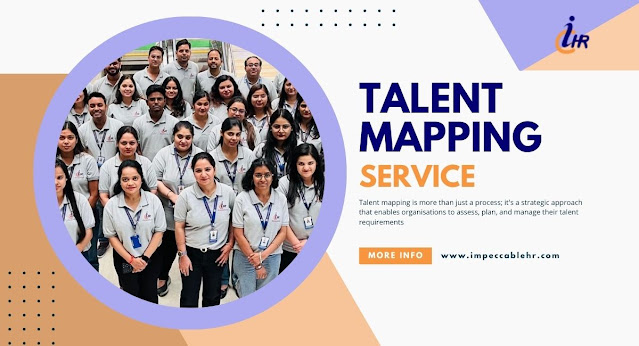Navigating Success: The Art of Talent Mapping
In today's dynamic and ever-evolving business landscape, the ability to identify and harness talent effectively can make all the difference in an organisation's success. Talent mapping, a strategic and forward-thinking process, plays a pivotal role in understanding the current talent pool and planning for future growth. In this article, we will explore the significance of talent mapping services, focusing on ImpeccableHR's expertise in this field.
The Essence of Talent Mapping
Talent mapping is more than just a process; it's a strategic approach that enables organisations to assess, plan, and manage their talent requirements. It involves creating a detailed blueprint of an organisation's existing talent pool and identifying gaps that need to be filled in the future. Talent mapping services are integral to succession planning, talent acquisition, and overall workforce optimization.
Here's why talent mapping matters:
1. Strategic Workforce Planning:
Talent mapping empowers organisations to align their human capital with their strategic objectives. It ensures that the right people are in the right roles at the right time.
2. Succession Planning:
Identifying potential leaders and successors within the organisation is a crucial part of talent mapping. This ensures a seamless transition when key positions become vacant.
3. Skill Gap Analysis:
It reveals gaps in the workforce's skills and capabilities, enabling organisations to proactively address these deficiencies through training and development programs.
4. Effective Talent Acquisition:
By understanding the talent landscape, organisations can make informed decisions about hiring and ensure that they attract the best candidates for their specific needs.
5. Reduced Turnover:
Talent mapping helps in recognizing and addressing issues that may lead to high turnover, such as lack of career progression opportunities.
6. Competitive Advantage:
Having a clear understanding of the talent available in the market allows organisations to stay ahead of competitors by attracting top talent before they do.
ImpeccableHR's Expertise in Talent Mapping
ImpeccableHR, based in India, is a prominent player in the field of talent mapping services. Their commitment to understanding an organization's unique requirements and tailoring solutions accordingly has earned them a strong reputation in the industry.
Here are some key reasons why organizations turn to ImpeccableHR for their talent mapping needs:
1. Customized Solutions:
ImpeccableHR recognizes that one size does not fit all in talent mapping. They work closely with each client to develop tailored solutions that meet their specific needs.
2. Market and Competitor Analysis:
Understanding the external talent landscape is as crucial as assessing the internal workforce. ImpeccableHR provides comprehensive market and competitor analysis to ensure organizations have a holistic view of the talent ecosystem.
3. Global Reach:
In an increasingly globalized world, ImpeccableHR's expertise extends beyond borders. They assist organizations in mapping talent not only in India but also on a global scale.
4. Strategic Insights:
ImpeccableHR doesn't stop at data collection. They provide valuable insights and recommendations based on their findings, enabling organizations to make informed decisions.
5. Experience and Expertise:
With a team of seasoned professionals, ImpeccableHR brings a wealth of experience to the table. Their consultants are well-versed in the intricacies of talent mapping.
6. Technology-Driven Approach:
ImpeccableHR leverages advanced technology and data analytics to ensure the accuracy and efficiency of their talent mapping services.
The Talent Mapping Process
Talent mapping involves a structured process that can be broken down into several key steps:
1. Understanding Organizational Goals:
The process begins with a clear understanding of the organization's goals, both short-term and long-term. What are the key positions that need to be filled? What skills are required to achieve those goals?
2. Internal Talent Assessment:
The next step involves an assessment of the existing talent within the organization. Who are the high-potential employees? What gaps exist in terms of skills and competencies?
3. External Talent Mapping:
This is where external talent is identified and assessed. It includes market analysis, competitor benchmarking, and a broader examination of the talent pool in the industry.
4. Gap Analysis:
By comparing internal talent with external talent, organizations can identify gaps. These gaps may pertain to skills, experience, or the number of potential successors for key positions.
5. Succession Planning:
Talent mapping enables organizations to put succession plans in place. It's a strategic approach to ensuring leadership continuity and addressing talent shortages.
6. Action Planning:
Based on the insights gained through talent mapping, organizations can develop action plans. These plans may involve recruitment, training and development, or performance management strategies.
7. Monitoring and Evaluation:
Talent mapping is an ongoing process. Regular monitoring and evaluation ensure that the organization remains on track in terms of talent management.
The Competitive Edge of Talent Mapping
In today's fiercely competitive business environment, having a deep understanding of your talent landscape provides a competitive edge. Here's how talent mapping can give organizations an advantage:
1. Proactive Talent Management:
Talent mapping enables organizations to be proactive rather than reactive. They can anticipate talent needs and address them ahead of time.
2. Cost Savings:
By understanding the talent market, organizations can make informed decisions about compensation, benefits, and hiring practices, potentially saving costs.
3. Improved Employee Engagement:
Employees are more likely to be engaged when they see a clear path for career growth within the organization. Talent mapping promotes this by identifying and nurturing high-potential individuals.
4. Agility and Adaptability:
In a rapidly changing business landscape, organizations need to be agile. Talent mapping helps in creating a flexible talent strategy that can adapt to changing circumstances.
5. Enhanced Reputation:
Being known for effective talent management can enhance an organization's reputation, making it an attractive destination for top talent.
Conclusion
Talent mapping is not a one-time activity; it's an ongoing strategic process that evolves with an organization's needs. ImpeccableHR, with its commitment to customization, expertise, and technology-driven approach, is a valuable partner for organizations seeking to navigate the complex landscape of talent management. In an era where talent is a critical driver of success, talent mapping is the compass that points organizations in the right direction, ensuring they have the right people in the right places at the right time.


.jpg)

Comments
Post a Comment